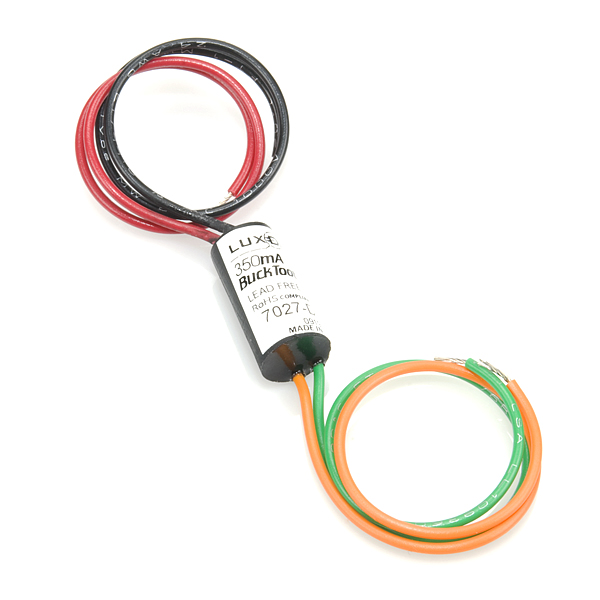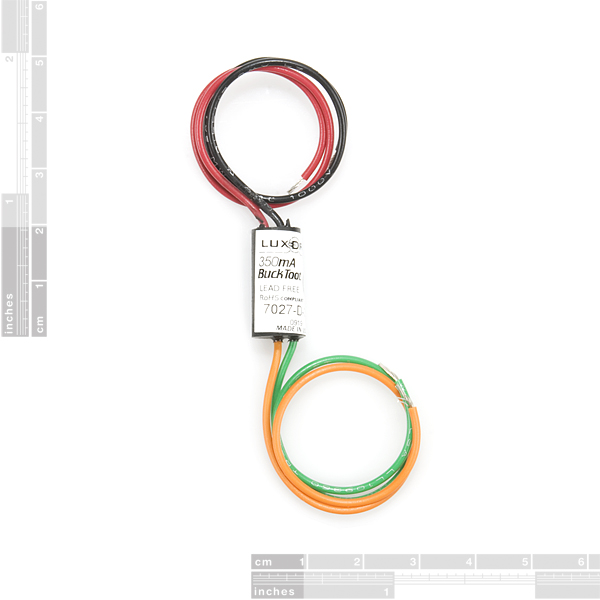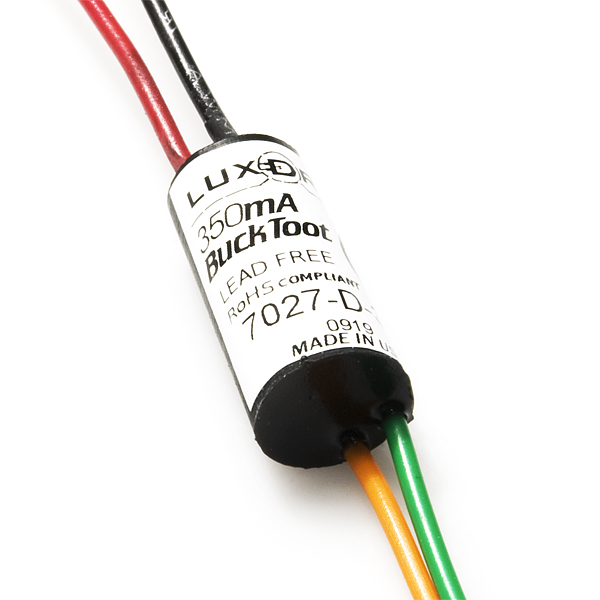7027 "BuckToot" LED Driver Module
The 7027 "BuckToot" LED Power Module is a true constant current regulated driver for LEDs. Unlike standard power supplies, which deliver a fixed voltage to the output, the BuckToot LED driver is designed to reliably vary the output voltage as required to deliver a stable constant current to the LED(s). The BuckToot exhibits very high efficiency and does not require external current limiting resistors or additional heat sinking.
The BuckToot operates with input voltages from 5 to 28VDC and can supply up to 350mA. It comes with four leads - black (-) and red (+) are for the input voltage and orange (+) and green (-) should be connected to the LEDs. It's a great, simple tool to regulate and drive your LEDs!
- DC input power up to 28V surge protected
- True constant current output
- Extremely small form-factor (10mm diameter x 19mm length)
- Output open and short circuit protection
7027 "BuckToot" LED Driver Module Product Help and Resources
Core Skill: Electrical Prototyping
If it requires power, you need to know how much, what all the pins do, and how to hook it up. You may need to reference datasheets, schematics, and know the ins and outs of electronics.
Skill Level: Rookie - You may be required to know a bit more about the component, such as orientation, or how to hook it up, in addition to power requirements. You will need to understand polarized components.
See all skill levels
Comments
Looking for answers to technical questions?
We welcome your comments and suggestions below. However, if you are looking for solutions to technical questions please see our Technical Assistance page.
Customer Reviews
No reviews yet.




It's preset to 350 mA, +/- 10%. Small and simple are the selling points for this.
I need the PROGRAMM /SOFTWARE to Control the lights for a dance Show with MUSIC . I work with professional dancers in Switzerland and i want to make a Light show to the MUSIC.
how many led can it drive at one time? I want to hook up up-to 200~10mm LEDs
Works fine driving three luxeon stars. Wish it cost half the list price.
A three terminal regulator (7805 or LM317) with a resistor between Vout and Adj makes a fine constant current regulator for LED arrays or LED backlights. Of course, it's linear, so any excess power is dumped as heat... but it's simple and cheap.
These are made by a company called LED Dynamics in my hometown. They have other, more flexible, current drivers that are capable of being PCB or breadboard mounted with both potentiometer or PWM output current adjustment. There is a limit on how fast you can switch the modules control line, however. IIRC, it was in the microseconds range. SF should carry the Buck-Puck LED drivers for people that want 3x the power and adjustable outputs. Maybe they already do, but I didn't notice.
My Bucktoot lasted about 3 minutes and failed. I suppose this is not typical but it doesn't make me want to spend another $14 to find out. Ran a single 350mA luxeon just fine but when I connected the next LED in series the Bucktoot failed. Now it just heats up whenever connected to input power even with no output load. Bummer :-(
This is a CURRENT regulating supply. It is different from what you may be used to which is a Voltage regulating supply.
It is fixed to drive 350 mA through whatever is attached to it. This is really nice for high power LEDs because you can put an arbitrary number of LEDs in series and it will drive them all to the same brightness without a current limiting resistor.
Note that putting 7 50mA LEDs in parallel is NOT equivalent to putting 1 350mA led on the driver. That is because the forward drop voltage of the LEDs in parallel may not be exactly the same, meaning one LED will go active, burn out (LEDs driving voltage drops when they turn on), and then the next will do the same, and so on.
These are for VERY bright LEDs in Series such as the ones listed in SMD in the LED section. a typical LED operates on
how much voltage come out the green and orange
It depends on what LEDs you are using. It will automatically adjust the output voltage.
To be a little more specific, the datasheet states the typical Input Margin (Vin-Vout) is ~2V. With an absolute maximum of rating of 28VDC, I wouldn't plan on higher than 26VDC total voltage drop and depending on the type of LEDs that could mean 6 to over a dozen.
Athough I'm not sure why so many basic LEDs are listed as related products, they have max currents several times less than 350mA...
Has anyone tried PWM switching the output or input of this regulator to vary LED intensity below the full 350 mA level?
On the previous question, the data sheet shows that you supply 2 volts or more above the LED requirements. This buck switching regulator will maintain 350 mA with little heating. It can only down-convert voltage and requires 2V more than the output to regulate correctly. It also requires 5V minimum.
Ya I'm doing that right now with a fez panda running the buck toot off a 12V lead acid battery and a mosfet on the ground of the input. It runs great varying intensity.
I'm confused on how this works...
You put in any voltage (within the ratings) and it determines what voltage and amperage the LEDs need, and supplies it?
Or is it only current? And you have to supply the proper voltage to start?
If it is the first way I mentioned, this would be very handy!
I got one of these, and it works great. However, does anyone know if there is an equivalent device intended for PCB design and automated board placement (ie. an IC chip design) to go on a breadboard or protoboard.
Thank you.
can this be PWM-ed with an arduino for dimming ?
I think it works grat.
Anyone know anything about the Bucktoot LED driver? I've got one and it's doing funny things.
I wired it to one of the 1W luxeon SMD chips and it turns on slowly, then steps the brightness down for a few steps, then goes out. Does this with both a high current capable lithium set at ~8V and an 18V NiCd, so I'm not sure what is going on.
Also, take care if checking both sides of the BuckToot with a scope. I just pumped 18V through my LED when I connected one channel to one side and the other channel to the other. :-(
How's it know what current to supply? No programming or setup?